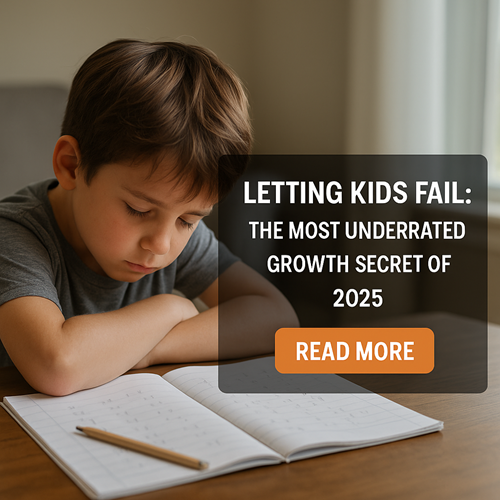Why Letting Kids Fail Matters More Than Ever
In today’s world of instant gratification and digital perfection, parenting has become more about protection than preparation. But here’s the hard truth: letting your child fail might just be the best gift you ever give them.
Sounds strange? Not when you realize that the greatest lessons in life often come from moments of struggle, not success. In 2025, where kids are growing up faster, smarter—but also more anxious—failure has become a necessary teacher.
Let’s dive into why this overlooked parenting strategy could be the key to raising stronger, happier kids.

The Rise of the Overprotected Generation
From GPS-tracked backpacks to never-miss-a-homework apps, modern parenting has turned into full-time damage control. While we mean well, shielding kids from every setback actually stunts their growth.
According to child psychologists, overprotection is contributing to:
- Increased anxiety and low resilience
- Poor decision-making and problem-solving skills
- Fear of failure and low confidence
By doing everything for them, we take away the chance for kids to learn by themselves.
How Failure Fuels Real Growth in Children
Let’s face it—no one likes to see their child upset. But discomfort is not danger.
Think about the first time you:
- Lost a game
- Forgot your lines on stage
- Missed a test
- Got rejected or embarrassed
These were tough moments. But they taught you resilience, humility, preparation, and how to try again.
Failure isn’t about suffering—it’s about strengthening.
Letting kids fail helps them:
- Build problem-solving skills
- Develop self-accountability
- Strengthen emotional intelligence
- Cultivate inner motivation
Real-Life Parenting Examples: Where Failing Builds Growth
1. School Projects
Let them build their own model or presentation—even if it flops. The learning is in the doing, not in the perfection.
2. Sports Tryouts
Missing the cut teaches work ethic, perseverance, and how to handle disappointment.
3. Friendship Disagreements
Instead of fixing social fights, let them talk it out and learn conflict resolution.
4. Spending Mistakes
If they blow their allowance too fast, let them wait till next month. Natural consequences teach the value of budgeting.
Smart Parenting Tips for 2025: Let Failure Be a Tool
1. Be a Safety Net, Not a Shield
Support them emotionally—but don’t always save them. Let them experience the fall and figure out how to rise.
2. Praise the Process, Not Just the Outcome
Celebrate effort, dedication, and improvement, not just victories.
3. Share Your Own Failures
Normalize setbacks. Let your kids know even adults mess up—and that’s okay.
4. Help Name Their Emotions
Talk about feelings like frustration, guilt, sadness. Emotional literacy builds resilience.
5. Resist the Fix-It Reflex
They forgot their water bottle? Missed homework? Don’t fix it. Let them feel the natural consequences.
What Science Says About Letting Kids Fail
Neuroscience supports the idea that failure creates growth. When children fail and try again, their brains build new neural pathways.
This enhances:
- Cognitive flexibility
- Creative problem solving
- Emotional adaptability
Kids who never fail may become more rigid, less creative, and more anxious.
The Risks of Always Rescuing Kids
When kids never experience failure:
- They fear trying new things
- They lack trust in their own judgment
- They struggle under real-world stress
- They become emotionally dependent on others
Protecting kids from pain might actually be protecting them from growth.
Easy Ways to Introduce ‘Safe Failures’ at Home
- Encourage age-appropriate independence (chores, decision-making)
- Let them manage small responsibilities on their own
- Don’t jump in when they’re struggling—coach from the sidelines
- Celebrate curiosity and effort over perfection
Final Thoughts: Growth Comes from Grit, Not Comfort
Parenting isn’t about making life easy for our kids. It’s about preparing them for the real world.
So next time your child fails—pause. Resist the urge to fix. Ask yourself:
“What will they learn if I don’t step in?”
That’s where growth begins.
FAQs: Letting Kids Fail and Learn
Q. Is it really okay to let my child fail?
ANS: Yes. Safe, age-appropriate failures help kids become resilient, emotionally intelligent, and independent.
Q. What if my child feels discouraged after failing?
ANS: Validate their feelings. Support them emotionally. Help them reflect and try again.
Q. When should I start allowing failures?
ANS: As early as toddlerhood. Small mistakes—like misplacing toys or spilling water—are early lessons in self-reliance.
Q. Won’t it affect their confidence?
ANS: No. Learning to bounce back builds real confidence—not the fragile kind based on praise alone.
Read More About :
- Is Your Child Drinking Soda—Or Is Soda Drinking Their Bones? Find Out Now.
- 10 Gentle Parenting Secrets to Raise Kind, Respectful, and Well-Behaved Kids
- Fun Educational Games to Play at Home
- How to Reduce Screen Time for Kids Without Stress: A Friendly Parent’s Guide
- 10 Brain Boosting Foods to Pack in Your Child Lunchbox

Hi, I’m Prashant Jain — a curious soul, storyteller, and content creator at heart.I’ve always been drawn to the world of entertainment, travel, sports, health & lifestyle — not just as a writer, but as someone who genuinely lives these experiences. Whether I’m binge-watching the latest OTT series, exploring offbeat spiritual destinations in India, or diving deep into wellness routines and cricket match insights, I love sharing what I discover with like-minded readers.
PopNewsBlend is my way of blending personal journeys with meaningful stories — ones that inform, inspire, and keep you ahead of the curve. Everything I write comes from real observations, hands-on experiences, and a deep passion for understanding the world around us.
Discover more from Popnewsblend
Subscribe to get the latest posts sent to your email.








Pingback: How Parents Anger Shapes Kids Behaviour - Know Before It's Late
Your point of view caught my eye and was very interesting. Thanks. I have a question for you.